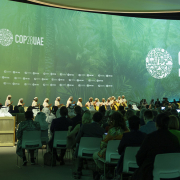The New Green Feudalism
With the 2024 election looming on the horizon, the Democratic Party faces a contradiction. By some important measures, the US economy is booming—third-quarter GDP growth figures were recently adjusted upward to a whopping 5.2 percent—but these numbers aren’t translating into political support for the current administration. A mere 32 percent of respondents approved of President Biden’s handling of the economy in a Gallup poll last month.
The disconnect between the economy as reported in quarterly figures and the economy as experienced by ordinary people is another reminder of the class divisions that increasingly define American life in the 21st century. Tech oligarchs, with support from a subset of well-compensated white-collar professionals, now preside over an economic order in which rising costs and expanding social control are justified as the necessary costs of the green transition. It should be no surprise that those seeing stable jobs and affordable housing evaporate aren’t thrilled by this sort of progress.
The internet revolution brought with it many conveniences, but greater equality or widespread prosperity weren’t among them. On the contrary, the web has created a corporate aristocracy that is increasingly unmoored from its surroundings, as well as an expanding class of precarious, low-wage workers. Private jet-flying tech oligarchs are thriving, but the gap between them and everyone else continues to grow, and real incomes continue to fall. At the bottom of the income scale, according to The Wall Street Journal, the United States “has seen a record increase in homeless people this year.”
The majority of Americans still consider themselves middle class. However, this default identification obscures the growing divide between those white-collar workers who benefit from expanding government power—whom I call the clerisy—and the traditional middle class made up of small-business owners, shopkeepers, and skilled artisans and mechanics. The clerisy’s numbers continue to grow; under Biden, most employment growth has been concentrated in government and publicly funded health care. The limited appeal of Bidenomics results in part from its heavy focus on subsidizing the clerisy, often at the expense of traditional energy, manufacturing, and logistics workers and businesses. The traditional middle and working classes stagger under growing monopoly power. Regulations increasingly imperil smaller firms, whereas larger firms are far more adept both at attracting big capital and coping with big government.
Once the epitome of competitive capitalism, the tech industry, as one Silicon Valley wag put it, now resembles “feudalism with better marketing.” In 2023, six of the world’s eight most-valued companies are tech firms; Apple, the first $3 trillion company, has a market valuation just below the GDP of India and the United Kingdom, and larger than those of Italy, Russia, or Canada.
The pursuit of the green agenda, accelerated under Biden, marks a new phase of feudalization. Nonprofits funded by green-tinged oligarchs to push renewable energy raise four times the amount of funding spent by advocates for nuclear or fossil fuels. Elon Musk, green capitalists in Silicon Valley, and Wall Street investors share the notion, as Treasury Secretary Janet Yellen put it, that climate change provides “the greatest economic opportunity of our time.” The green gold rush is on; the Financial Times estimates there is more than $200 billion invested in “cleantech” projects in the United States alone. It is doubtful how much of this would occur without government subsidies.
Read the rest of this piece at Compact Magazine.
Joel Kotkin is the author of The Coming of Neo-Feudalism: A Warning to the Global Middle Class. He is the Roger Hobbs Presidential Fellow in Urban Futures at Chapman University and Executive Director for Urban Reform Institute. Learn more at joelkotkin.com and follow him on Twitter @joelkotkin.
Photo: Paul Kagame via Flickr, under CC 2.0 License
Read the rest of this piece at Compact Magazine.
Joel Kotkin is the author of The Coming of Neo-Feudalism: A Warning to the Global Middle Class. He is the Roger Hobbs Presidential Fellow in Urban Futures at Chapman University and Executive Director for Urban Reform Institute. Learn more at joelkotkin.com and follow him on Twitter @joelkotkin.
Photo: Paul Kagame via Flickr, under CC 2.0 License



